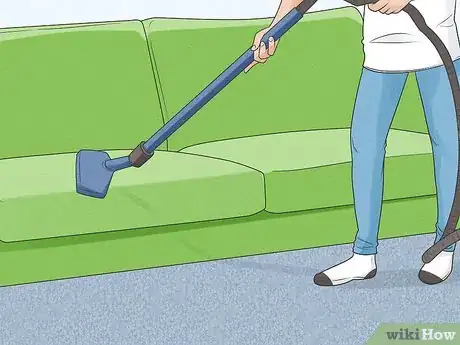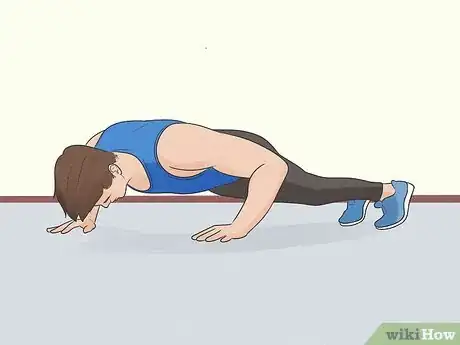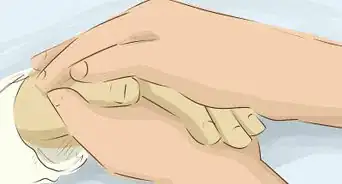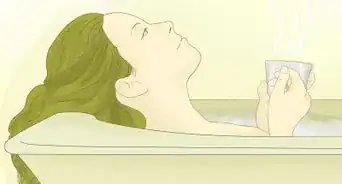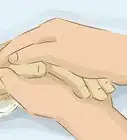This article was co-authored by Rebecca Tenzer, MAT, MA, LCSW, CCTP, CGCS, CCATP, CCFP and by wikiHow staff writer, Janice Tieperman. Rebecca Tenzer is the owner and head clinician at Astute Counseling Services, a private counseling practice in Chicago, Illinois. With over 18 years of clinical and educational experience in the field of mental health, Rebecca specializes in the treatment of depression, anxiety, panic, trauma, grief, interpersonal relationships using a combination of Cognitive Behavioral therapy, Psychodynamic therapy, and other evidence-based practices. Rebecca holds a Bachelor of Arts (BA) in Sociology and Anthropology from DePauw University, a Master in Teaching (MAT) from Dominican University, and a Master of Social Work (MSW) from the University of Chicago. Rebecca has served as a member of the AmeriCorps and is also a Professor of Psychology at the collegiate level. Rebecca is trained as a Cognitive Behavioral Therapist (CBT), a Certified Clinical Trauma Professional (CCTP), a Certified Grief Counseling Specialist (CGCS), a Clinical Anxiety Treatment Professional (CCATP), and a Certified Compassion Fatigue Professional (CCFP). Rebecca is also a member of the Cognitive Behavioral Therapy Society of America and The National Association of Social Workers.
There are 17 references cited in this article, which can be found at the bottom of the page.
This article has been viewed 62,662 times.
Happiness can seem really hard to find, especially given the uncertainty in our world right now. It takes a lot of courage to take the first step forward to find this seemingly elusive feeling, but there’s nothing to fear! The key to staying happy often lies in your thoughts, decisions, and daily habits.[1] While it may take a leap of faith, you can trust in the fact that happiness is much easier to find and maintain than you think.
Steps
Finding Active Ways to Be Happy
-
1Spend time pursuing your passions. Think about what really makes you happy, whether it’s woodworking, playing a musical instrument, or some other hobby. Do your best to measure out some time in your schedule for these interests, even if it’s only for an hour. If you spend your free time doing things you enjoy, then you’ll experience a lot more happiness in the long run.[2]
- For instance, you can ask a neighbor to watch your kids for an evening while you go to a special class or workshop.
- If you can’t figure out what your passions are, that’s okay! Spending time learning new skills and improving yourself are still great ways to find and maintain happiness.[3]
-
2Choosing a fulfilling career that really makes you happy. Think about the type of you’d really love to have—not just a career that makes you money. Don’t tie yourself down to a job that makes you feel unhappy. Instead, keep your eye out for new opportunities![4]
- For instance, if you’re working a desk job solely to pay the bills, start looking into career options that better suit your interests, whether it’s graphic design, public relations, or anything else under the sun.
- It can be hard to face your fears, whether they’re related to money or the uncertainty of the future. The more time you spend facing these fears, the happier you’ll be in the long run![5]
- Ask your friends and family for advice if you need it.
Advertisement -
3Surround yourself with caring, loving people. Think about all of the people in your life, whether they’re friends or family. Ask yourself if these people really make you happy, or if they tend to bring down your mood. If you spend your free time with loving, positive people, you’ll likely feel and stay a lot happier.[6]
- There’s nothing wrong with cutting toxic people out of your life! Life’s too short to surround yourself with miserable, unhappy people.
-
4Spend your free time helping others. Search online for volunteer opportunities in your area. Look for charities and organizations that support causes that you really believe in, and see if you can donate your time and money to them. If you spend time helping others, you can feel really happy and fulfilled knowing that you’ve made a difference.[7]
- For instance, if you love animals, you can spend your weekends volunteering at an animal shelter.
- If you want to help impoverished communities, you can sponsor a child via a third-party organization.
Adjusting Your Routine
-
1Clean up your living space. Set aside some time to tidy up a cluttered area of your home, whether it’s your bathroom, bedroom, or some other area where you spend a lot of time. You may feel productive and happier if you’re spending time in a clean living space. It’ll also feel good to make progress on a big project![8]
- If your room is messy, you may not be able to sleep as well.
-
2Take a trip to change up your scenery. Plan a day trip or weekend getaway so you can escape from the usual pace of your daily routine. A trip can give you something to look forward to, and may help improve your mood, too![9]
- Plan a trip to a place where you can see a lot of open water and blue skies, which can really help improve your mood.
-
3Stay distracted if you’re feeling stressed out. Make a list of small activities that you can do if you find yourself feeling stressed or down in the dumps. Spend a few minutes doing this activity so you can take your mind off whatever is making you unhappy. As you go through your daily routine, don’t be afraid to lean on these activities for extra support![10]
- For instance, if you’re thinking about stressful activities, you can help redirect your thoughts to a more positive activity, like doing a puzzle, listening to music, playing a video game, or going for a walk.
-
4Exercise on a regular, frequent basis. Take a few minutes each day to get in a workout, whether it’s running, jump roping, swimming, playing a sport, or some other activity you enjoy.[11] When you exercise, your brain releases several chemicals that leave you feeling happy. If you exercise on a regular basis, you may find yourself feeling happier as you finish your workout..[12]
- You can choose any physical activity for this. What matters most is that you choose something that you enjoy!
Changing Your Mindset
-
1Think positively to help yourself stay happy. Take a moment to ask yourself if you spend a lot of time thinking positively—if not, try making a few adjustments to your thought processes. Condition yourself to connect a positive feeling with simple tasks, like understanding how something works, or doing a task correctly. Once you make positive thinking a habit, you’ll be able to feel much happier on a regular basis.[13]
- For instance, if you troubleshoot an issue with your computer, you can reward yourself by feeling positive and happy.
- Similarly, if you do something productive, like accomplishing a task at work, you can reward yourself by feeling happy.[14]
-
2Practice mindfulness on a regular basis. Mindfulness helps you slow down your thinking and view things as a third-party observer. If you practice mindfulness regularly, you’ll have more time to appreciate small things that you wouldn’t normally notice. You can also use this skill to monitor how you react to negative thoughts and encounters in your daily life. [15]
- For instance, if you practice mindfulness on a sunny day, you may have greater appreciation for how warm the sun feels, or how nice the air smells.
-
3Choose laughter whenever you can. Laughter doesn’t just feel good, but it’s physically good for you, as well! Whenever you laugh, your body releases endorphins, which are chemicals that help you feel happy. You’ll also feel a lot more relaxed, and less tempted to hold onto negative feelings, like anger.[16]
- Laughter has major benefits for your health, too! It helps improve your blood flow, strengthens your immune system, and burns a very small handful of calories, to boot!
-
4Look on the bright side of every situation. Try to view the glass as half full, even if your mind is more hard-wired to view it as more half-empty. In fact, studies show that people who make an effort to view life more positively tend to live longer. With this in mind, try to nip your bad thoughts in the bud as soon as they pop up in your mind—instead, reframe the situation so you can look at it in a more positive light![17]
- For instance, if a package you were expecting doesn’t arrive, remind yourself that you’ll have something to look forward to the next day.
- If you drop a glass on the floor, you can remind yourself that it’s just 1 glass, and not a big deal in the grand scheme of things.
-
5Write down positive thoughts in a gratitude journal. Keeping a journal may seem silly, but it can be a really effective way to feel happier and more content. Once a day, jot down something good that happened in a notebook, even if it seems insignificant. Try to get in the habit of writing down positive things in your journal each day, which can help you feel and stay happy. You may be surprised how many small blessings are in your life![18]
- For instance, you can write something like: “Today, my coworker told me that she liked my outfit. It was a quick comment, but it made me feel confident and proud of myself. I’m grateful to be surrounded by kind people who notice and appreciate me.”
-
6Look for the positives in past negativity. Try not to spend too much time dwelling on the past, even if it’s tempting. If you find yourself stuck mulling over past events, spin your thoughts in a positive light by focusing on the positives from the situation. While it can be really hard, make an effort to choose gratitude over any negative, residual feelings.[19]
- For instance, if you recently cut ties with a toxic friend, don’t think about all the things that went wrong in the relationship. Instead, think about how you’re now surrounded by loving and caring friends.
Putting Yourself First
-
1Allow yourself to feel emotional. It’s perfectly normal and okay if you don’t want to cry or show other obvious displays of emotion. As painful as it is, suppressing your sad feelings will make it harder for you to recognize and truly appreciate when you’re feeling happy.[20] Additionally, hiding your feelings usually doesn’t fix the root of the issue that’s actually making you upset. Even if it’s hard, take a few minutes of alone time so you can process what you’re going through.[21]
- The feeling of happiness is acknowledging that things are positive and good. To really appreciate this, you also need to understand what your negative emotions feel like.
-
2Keep yourself accountable for your own happiness.[22] You may not be able to summon happiness overnight, but you can get in the habit of feeling happy, even if the circumstances around you aren’t that great. Keep tabs on how you respond to negative events—similar to lifting weights, maintaining a positive attitude requires a lot of mental training and dedication. Be patient with yourself, and make the adjustments you need to put yourself on a happier, more fulfilling path.[23]
- For instance, if you’re dealing with a rude employee at a grocery store, you can remind yourself that you’ll have plenty of tasty snacks that you can enjoy at home.
- If it’s raining outside, use the afternoon to get caught up on your favorite TV show instead of dwelling on how icky the weather is.
- Go easy on yourself—it takes a lot of focus and practice to really turn your mood around.
-
3Avoid comparing yourself to other people. Resist the temptation to compare your physical qualities and talents to the people around you. Instead, remind yourself that you are a talented and capable individual, regardless of what other people can do. You can also find happiness in the fact that you are your own person with your own gifts and talents that no one can take away from you.[24]
- It may help to avoid websites or other places where you tend to compare yourself a lot, like social media.
- For instance, if someone looks more in shape than you, tell yourself something like this: “I may not be as athletic as this person, but I’m still beautiful.”
-
4Log out of social media for a little while. Social media, for better or for worse, can be a big source of unwanted stress. Take a few hours, days, or however much time you need to log out from Facebook, Twitter, and any other social network. Spend this free time recharging and relaxing without worrying about social media.[25]
Expert Q&A
Did you know you can get expert answers for this article?
Unlock expert answers by supporting wikiHow
-
QuestionHow will establishing a daily routine help me stay happy and improve my life?
 Michelle Shahbazyan, MS, MAMichelle Shahbazyan is the Founder of The LA Life Coach, a concierge life, family, and career coaching service based in Los Angeles, California. She has over 10 years of experience with life coaching, consulting, motivational speaking, and matchmaking. She has a BA in Applied Psychology and an MS in Building Construction and Technology Management from Georgia Tech University, and a MA in Psychology with an emphasis on Marriage and Family Therapy from Phillips Graduate University.
Michelle Shahbazyan, MS, MAMichelle Shahbazyan is the Founder of The LA Life Coach, a concierge life, family, and career coaching service based in Los Angeles, California. She has over 10 years of experience with life coaching, consulting, motivational speaking, and matchmaking. She has a BA in Applied Psychology and an MS in Building Construction and Technology Management from Georgia Tech University, and a MA in Psychology with an emphasis on Marriage and Family Therapy from Phillips Graduate University.
Matchmaker, The LA Life Coach Depending on what it is you want to ultimately achieve, a daily routine can help provide basic steps to get to that place. Very small things like setting an alarm and waking up at a particular time five days a week can help your mind learn how to form daily habits. Once you achieve small steps like that, it will become so much easier to accomplish bigger and bigger goals.
Depending on what it is you want to ultimately achieve, a daily routine can help provide basic steps to get to that place. Very small things like setting an alarm and waking up at a particular time five days a week can help your mind learn how to form daily habits. Once you achieve small steps like that, it will become so much easier to accomplish bigger and bigger goals. -
QuestionHow can I change my life and find happiness?
 Michelle Shahbazyan, MS, MAMichelle Shahbazyan is the Founder of The LA Life Coach, a concierge life, family, and career coaching service based in Los Angeles, California. She has over 10 years of experience with life coaching, consulting, motivational speaking, and matchmaking. She has a BA in Applied Psychology and an MS in Building Construction and Technology Management from Georgia Tech University, and a MA in Psychology with an emphasis on Marriage and Family Therapy from Phillips Graduate University.
Michelle Shahbazyan, MS, MAMichelle Shahbazyan is the Founder of The LA Life Coach, a concierge life, family, and career coaching service based in Los Angeles, California. She has over 10 years of experience with life coaching, consulting, motivational speaking, and matchmaking. She has a BA in Applied Psychology and an MS in Building Construction and Technology Management from Georgia Tech University, and a MA in Psychology with an emphasis on Marriage and Family Therapy from Phillips Graduate University.
Matchmaker, The LA Life Coach Find those little things along the way and make changes. It's usually a finite list of things, and once you get through everything, your success and productivity starts to kick in. There's no reason any human being shouldn't be excited about everything that they do every day. Some times people are stuck in situations that they don't have control over, but even within those situations, you can find time and energy to get more motivated and excited in your life so that you can make your goals happen.
Find those little things along the way and make changes. It's usually a finite list of things, and once you get through everything, your success and productivity starts to kick in. There's no reason any human being shouldn't be excited about everything that they do every day. Some times people are stuck in situations that they don't have control over, but even within those situations, you can find time and energy to get more motivated and excited in your life so that you can make your goals happen. -
QuestionHow do you make the big sad go away?
 Rebecca Tenzer, MAT, MA, LCSW, CCTP, CGCS, CCATP, CCFPRebecca Tenzer is the owner and head clinician at Astute Counseling Services, a private counseling practice in Chicago, Illinois. With over 18 years of clinical and educational experience in the field of mental health, Rebecca specializes in the treatment of depression, anxiety, panic, trauma, grief, interpersonal relationships using a combination of Cognitive Behavioral therapy, Psychodynamic therapy, and other evidence-based practices. Rebecca holds a Bachelor of Arts (BA) in Sociology and Anthropology from DePauw University, a Master in Teaching (MAT) from Dominican University, and a Master of Social Work (MSW) from the University of Chicago. Rebecca has served as a member of the AmeriCorps and is also a Professor of Psychology at the collegiate level. Rebecca is trained as a Cognitive Behavioral Therapist (CBT), a Certified Clinical Trauma Professional (CCTP), a Certified Grief Counseling Specialist (CGCS), a Clinical Anxiety Treatment Professional (CCATP), and a Certified Compassion Fatigue Professional (CCFP). Rebecca is also a member of the Cognitive Behavioral Therapy Society of America and The National Association of Social Workers.
Rebecca Tenzer, MAT, MA, LCSW, CCTP, CGCS, CCATP, CCFPRebecca Tenzer is the owner and head clinician at Astute Counseling Services, a private counseling practice in Chicago, Illinois. With over 18 years of clinical and educational experience in the field of mental health, Rebecca specializes in the treatment of depression, anxiety, panic, trauma, grief, interpersonal relationships using a combination of Cognitive Behavioral therapy, Psychodynamic therapy, and other evidence-based practices. Rebecca holds a Bachelor of Arts (BA) in Sociology and Anthropology from DePauw University, a Master in Teaching (MAT) from Dominican University, and a Master of Social Work (MSW) from the University of Chicago. Rebecca has served as a member of the AmeriCorps and is also a Professor of Psychology at the collegiate level. Rebecca is trained as a Cognitive Behavioral Therapist (CBT), a Certified Clinical Trauma Professional (CCTP), a Certified Grief Counseling Specialist (CGCS), a Clinical Anxiety Treatment Professional (CCATP), and a Certified Compassion Fatigue Professional (CCFP). Rebecca is also a member of the Cognitive Behavioral Therapy Society of America and The National Association of Social Workers.
Clinical Therapist & Adjunct Professor Clinical Therapist & Adjunct ProfessorExpert Answer
Clinical Therapist & Adjunct ProfessorExpert Answer
References
- ↑ Michelle Shahbazyan, MS, MA. Life Coach. Expert Interview. 18 March 2020.
- ↑ https://www.nytimes.com/2018/10/10/smarter-living/follow-your-passion-hobbies-jobs-self-care.html
- ↑ Michelle Shahbazyan, MS, MA. Life Coach. Expert Interview. 18 March 2020.
- ↑ https://www.forbes.com/sites/kathycaprino/2013/08/26/7-essentials-for-a-happy-and-fulfilling-career/
- ↑ Michelle Shahbazyan, MS, MA. Life Coach. Expert Interview. 18 March 2020.
- ↑ https://www.unh.edu/healthyunh/blog/2012/10/surround-yourself-happy-people-be-happy
- ↑ https://time.com/collection/guide-to-happiness/4070299/secret-to-happiness/
- ↑ https://www.bbc.com/future/article/20200317-covid-19-how-to-stay-happy-during-the-coronavirus-outbreak
- ↑ https://www.bbc.com/future/article/20200317-covid-19-how-to-stay-happy-during-the-coronavirus-outbreak
- ↑ https://www.bbc.com/future/article/20200317-covid-19-how-to-stay-happy-during-the-coronavirus-outbreak
- ↑ Michelle Shahbazyan, MS, MA. Life Coach. Expert Interview. 18 March 2020.
- ↑ https://www.cnet.com/health/ways-exercise-makes-you-happier/
- ↑ https://www.psychologytoday.com/us/blog/click-here-happiness/201803/think-positive-11-ways-boost-positive-thinking
- ↑ Michelle Shahbazyan, MS, MA. Life Coach. Expert Interview. 18 March 2020.
- ↑ https://www.psychologytoday.com/us/blog/the-mindful-self-express/202001/the-surprising-reason-mindfulness-makes-you-happier
- ↑ https://www.helpguide.org/articles/mental-health/laughter-is-the-best-medicine.htm
- ↑ https://www.nytimes.com/2020/01/27/well/mind/optimism-health-longevity.html
- ↑ https://www.helpguide.org/articles/mental-health/cultivating-happiness.htm
- ↑ https://www.helpguide.org/articles/mental-health/cultivating-happiness.htm
- ↑ Rebecca Tenzer, MAT, MA, LCSW, CCTP, CGCS, CCATP, CCFP. Clinical Therapist & Adjunct Professor. Expert Interview. 19 August 2020.
- ↑ https://www.psychologytoday.com/us/blog/mindful-musings/201611/3-reasons-let-yourself-feel-your-emotions
- ↑ Michelle Shahbazyan, MS, MA. Life Coach. Expert Interview. 18 March 2020.
- ↑ https://www.psychologytoday.com/us/blog/sapient-nature/201112/taking-personal-responsibility-your-happiness
- ↑ https://www.psychologytoday.com/us/blog/prescriptions-life/201803/how-stop-comparing-yourself-others
- ↑ https://www.bbc.com/future/article/20200317-covid-19-how-to-stay-happy-during-the-coronavirus-outbreak
- ↑ https://news.cornell.edu/stories/2013/04/good-nights-sleep-linked-happiness





